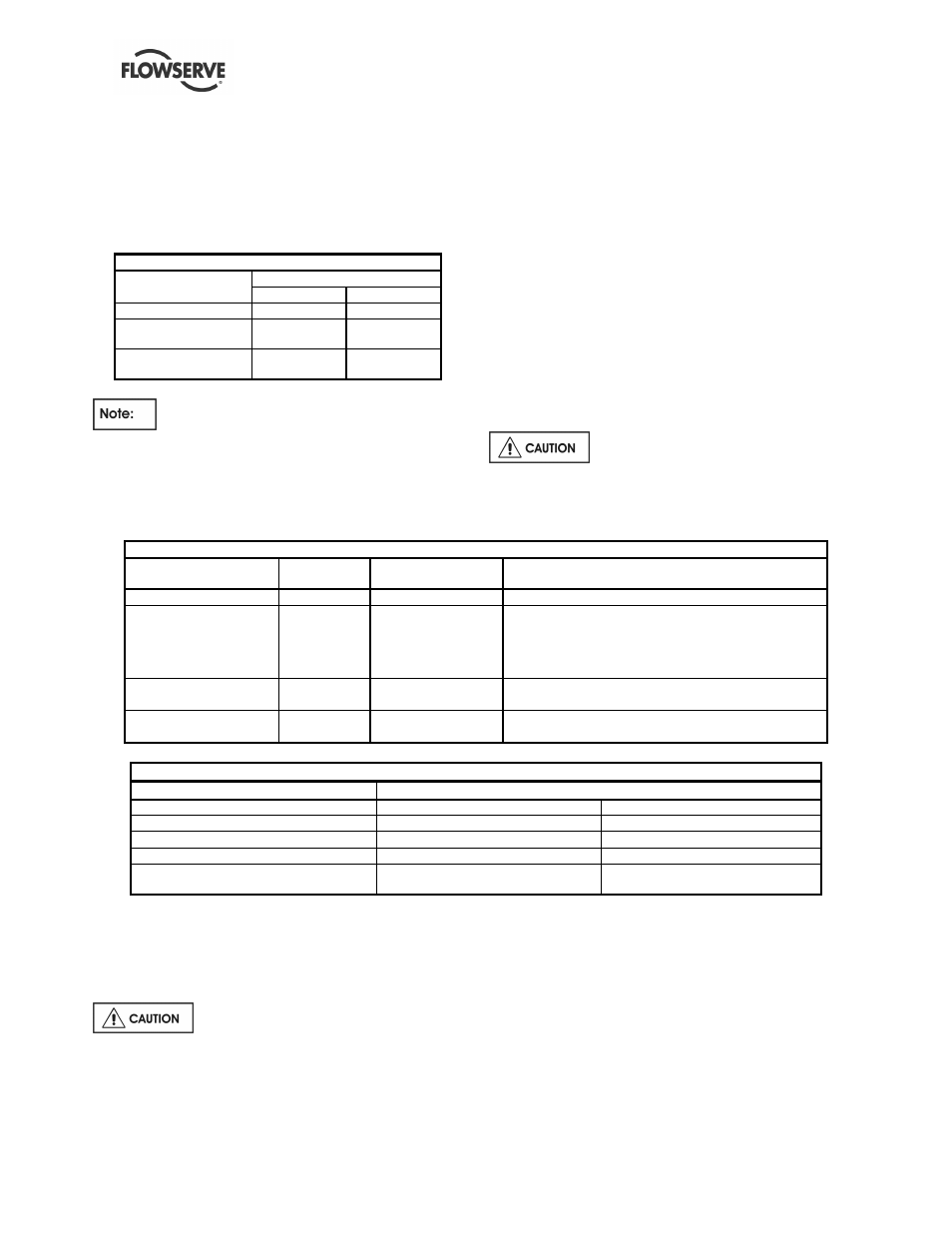Flowserve DMX User Manual
Page 30

DMX/DMXD/DMXH/DMXDH USER INSTRUCTIONS ENGLISH 85392728 - 10/09
Page 30 of 60
The frequency of oil change depends on the
operating conditions and the quality of the lubricant.
Oil should be checked for deterioration and
contamination weekly during periods of operation.
The following guideline is based on the Cleanliness
Code described in ISO 4406-1999.
Oil Cleanliness Values
Intervals
ISO 4406 Cleanliness Code
R6
µ
m
R14
µ
m
During Factory Tests
20
18
First 100 hours of
Field Operation
20
18
Every 2000 hours of
Field Operation
19
17
The listed oil cleanliness values are for
reference only. Deviations from the listed values
should be communicated to Flowserve for evaluation.
Mineral oils oxidize and should be replaced at
intervals described in the table below.
5.2.2
Oil specifications
Straight mineral oils without additives are generally
preferred for bearing lubrication. It should preferably
be of the turbine type and not contain free acid,
chlorine, sulfur or more than a trace of free alkali.
Quality mineral oils with a minimum Viscosity Index
(VI) of 95 is recommended.
An ISO Viscosity Grade (VG) Number identifies
lubricating oils. The VG Number is the viscosity of the
oil at 40 °C. (104 °F.) in centistokes, see table b elow.
In the majority of instances, a turbine oil with a VG
Number of 46 (nominally equivalent to SAE 20) will
meet rolling element bearing lubrication requirements
(see oil temperature).
Lubricant must be compatible with all
parts requiring lubrication.
Oil replacement interval
Typical Oil Operating
Temperature
Operating
Cycle
Oil Change
Interval
Notes
Ambient
Stand by
6 calendar months
Ambient – 71
°
C
(Ambient to 160
°
F)
Continuous
3 calendar months
Longer intervals between replacements may be
possible at these operating temperatures, but 3 month
intervals are recommended to protect against normal
oxidation, contamination, and deterioration. Regular oil
monitoring can inform this decision.
71
°
C – 82
°
C
(160
°
F – 180
°
F)
Continuous
3 calendar months
3 month intervals are recommended to protect against
normal oxidation, contamination, and deterioration.
> 82
°
C
(> 180
°
F)
Continuous
As specified by
Flowserve
Continuous operation at oil temperatures above 82
°
C
(180
°
F) requires consultation with Flowserve.
Oil specifications and characteristics
Oil Characteristics
Operating Oil Temperature
16
o
C - 38
o
C (60
o
C -100
o
F)
38
o
C - 82
o
C (101
o
F -180
o
F).
Saybolt Viscosity (SSU) 38
o
C (100
o
F)
158 Seconds
215 Seconds
Pour Point
-7
o
C (20
o
F)
-7
o
C (20
o
F)
Flash Point
204
o
C (400
o
F)
204
o
C (400
o
F)
Recommended ISO Viscosity
Grade (VG) Number
32
46
5.2.3
Oil temperature
Oil temperature should be maintained between 16
o
C
(60
o
F) and 82
o
C (180
o
F).
The minimum bearing oil temperature
is 16
o
C (60
o
F). If necessary, prior to startup, one of
the following procedures should be employed:
a) Drain the oil in the bearing housing(s) and
replace with warm oil.
b) Heat the bearing housing(s) using heat tape (or
other suitable means).
c) Circulate warm liquid through the cooling jacket
or immersion cooler (if supplied).
d) Utilize oil with a lower viscosity, or VG number, or
consider using a synthetics hydrocarbon oil with
